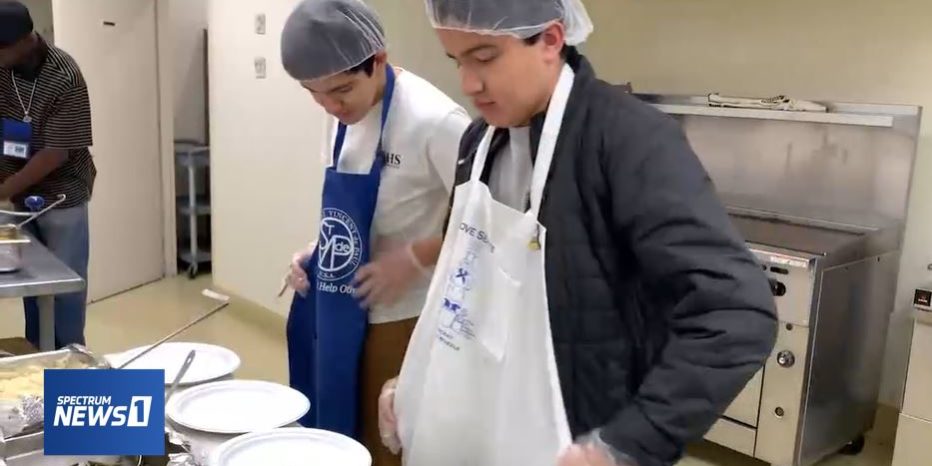The article below was published by Spectrum News. They featured two students from Loyola High School who spent their senior service project serving and sleeping at our homeless shelter on Skid Row, the Cardinal Manning Center.
Twin High School Athletes Spend 3 Weeks Sleeping on Skid Row
SKID ROW, Calif. – At 5:45 pm Gabriel and Francisco Salinas are getting ready for their night shift.
They have it down to a science, starting with the gloves, then the hair net, and finally the aprons.
“It looks like green beans, potatoes and chicken,” Gabriel says as he uncovers the trays of food.
When it came time for their senior service project, the twin brothers from Loyola High School had an unusual idea.
“Some of my friends are helping out at schools or assisting nurses at hospital but Francisco and I decided to work at homeless shelter,” Gabriel said.
Not just any shelter, the Cardinal Manning Center in the heart of Skid Row. But that wasn’t the unusual part. Gabriel and Francisco decided they wanted to spend not just their days there, but their nights too.
“That way it becomes more important to you and it sort of inspires you to be more involved in the community,” Gabriel said.“That way it becomes more important to you and it sort of inspires you to be more involved in the community,” Gabriel said.
For Francisco, it was a way to get a closer look into the lives of those living on the streets.
“There’s a completely different world out there that really goes unmentioned and I think that’s a huge problem with the homeless crisis, that we don’t talk about it enough,” he said.
And if you think this is just another pseudo-project for suburban kids, think again. Their only time off is three hours each morning for cross training practice. But other than that, for three weeks this shelter has been their home.
If you ask the residents here, that makes all the difference.
“It brings sincerity and a little bit of the other side of the coin more into focus,” resident Tim Nisson said.
The twins settle in at one of the shelter’s administrative offices. The have blow-up beds and blankets. They insisted on not taking any of the 65 beds reserved for the residents.
Before hitting the lights, one last assignment: a journal entry on how their day went.
“I think three weeks living with the residents just a couple of doors down is definitely a whole learning process that I don’t think I’d get from any other service project,” Gabriel said. “There is still a lot to learn.”






